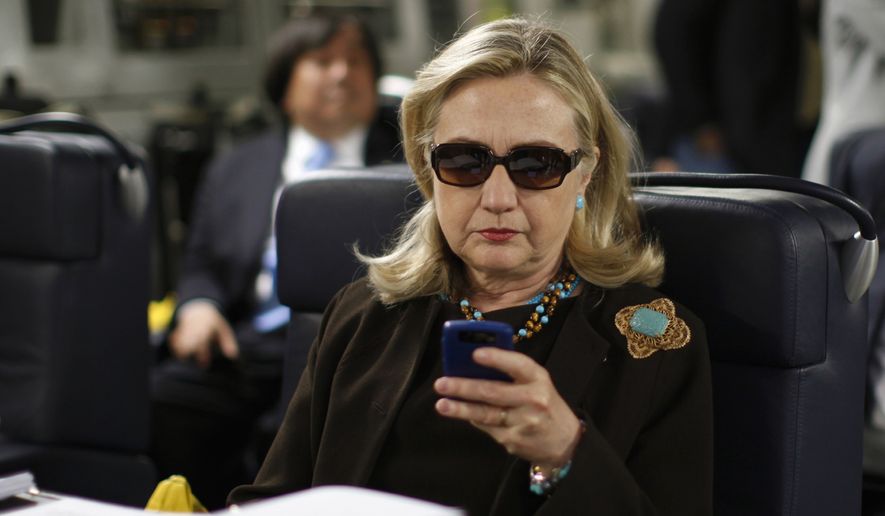Federal investigators said Thursday that they had found at least some of the missing text messages between two FBI officials, as Republicans raised more questions about anti-Trump bias at the government’s chief law enforcement agency.
Justice Department Inspector General Michael Horowitz told Congress that his investigators had managed to recover messages between FBI agent Peter Strzok and FBI lawyer Lisa Page, who were both ousted from the investigation into Russian meddling in the U.S. election.
Republicans had wondered how the messages disappeared — particularly after another batch between the reported lovers revealed a number of curiosities about the investigations of 2016 Democratic presidential candidate Hillary Clinton and Republican candidate Donald Trump.
In October 2016, the pair exchanged texts about a Wall Street Journal article detailing potential conflicts of interest in the FBI’s criminal investigation into Mrs. Clinton. The article noted that Deputy FBI Director Andrew McCabe’s wife’s political campaign received over a half-million dollars from entities tied to Virginia Gov. Terry McAuliffe, a close friend of Mrs. Clinton.
Furthermore, The Wall Street Journal reported that 98 percent of that money was donated after the FBI started the Clinton investigation.
Texts between Mr. Strzok and Ms. Page appear to show that FBI Chief of Staff James Rybicki believed Mr. McCabe should have recused himself from the investigation. Mr. McCabe did not recuse himself until one week before the presidential election.
“Rybicki just called to check in,” Ms. Page said in the text. “He very clearly 100 percent believes that Andy should be recused because of the ’perception.’ “
Ms. Page then says, “If its a matter similar to those we’ve been talking about lately, why no recusal before?”
“I assume McAuliffe picked up,” Mr. Strzok responded. “But that doesn’t make sense. He said he was interviewing, maybe he’s headed into private practice.”
In another exchange, Ms. Page warned Mr. Strzok about coming on too strong in investigating Mrs. Clinton.
“One more thing: she might be our next president. The last thing you need us going in there loaded for bear,” Ms. Page said in the text.
Mr. Strzok responded that he agreed.
Senate Judiciary Committee Chairman Charles E. Grassley, Iowa Republican, released the texts and fired off a letter to FBI Director Christopher Wray saying the messages raise questions about conflicts of interest in the Clinton investigation.
Mr. Grassley wrote that those leading the investigation “cared very much about politics, to the detriment of the Bureau’s mission and objectivity.”
The texts are part of 384 messages between Mr. Strzok and Ms. Page that were released to the Judiciary Committee last weekend. In all, the FBI officials exchanged more than 50,000 texts from July 2015 to July 2017.
Republicans said they suspected something fishy when the Justice Department said it couldn’t find messages between the two from Dec. 14, 2016, to May 17, 2017.
Mr. Trump said on Twitter that the missing texts were “one of the biggest stories in a long time.” Rep. Mark Meadows, North Carolina Republican, demanded that the FBI “tell the truth” about the vanished texts.
The inspector general said Thursday that he was able to recover messages from that period. However, it was not clear whether he had found all or just a portion of the texts exchanged and if those messages were intact.
Mr. Strzok and Ms. Page are former members of special counsel Robert Mueller’s team investigating suspected links between Russia and Mr. Trump’s presidential campaign.
Republican lawmakers and the president said the messages were proof of the Russia investigation’s political bias. Mr. Strzok, who also investigated Mrs. Clinton’s use of a private email server during her term as secretary of state was removed from the Russia probe after the anti-Trump texts were revealed. Ms. Page left Mr. Mueller’s team last summer.
Mr. Horowitz did not say in his letter how the missing texts were recovered.
Steven Aftergood, a classification policy specialist with the Federation of American Scientists, said given the quick turnaround, recovering the missing texts might not have been as difficult as first thought.
“This might not have been a triumph of forensic analysis,” he said. “It might simply have been that the texts were archived in an unexpected way that turned up once they started looking for them.”
• Jeff Mordock can be reached at jmordock@washingtontimes.com.




Please read our comment policy before commenting.